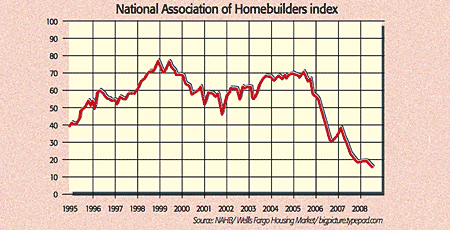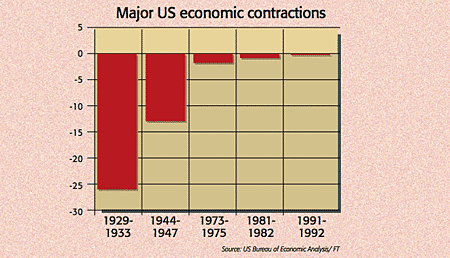Get the latest financial news, insights and expert analysis from our award-winning MoneyWeek team, to help you understand what really matters when it comes to your finances.
You are now subscribed
Your newsletter sign-up was successful
Want to add more newsletters?

Twice daily
MoneyWeek
Get the latest financial news, insights and expert analysis from our award-winning MoneyWeek team, to help you understand what really matters when it comes to your finances.

Four times a week
Look After My Bills
Sign up to our free money-saving newsletter, filled with the latest news and expert advice to help you find the best tips and deals for managing your bills. Start saving today!
The flood waters haven't "receded... but they have stopped rising", as Gerald Baker puts it in The Times. Stocks rebounded from last week's slump, which had seen the S&P 500 and FTSE 100 hit five-year lows early this week. They were due a bounce: extreme levels of risk aversion tend to presage a turning point, and last week the Vix volatility index, a gauge of fear on Wall Street, had hit record levels.
Meanwhile, interbank lending rates have eased: the cost of borrowing in euros for three months has fallen to the lowest level since Lehman Brothers collapsed, while the overnight dollar rate has declined below the main US interest rate for the first time since early October. Credit default swap spreads on banks, a gauge of their risk of bankruptcy, have tumbled. Worldwide bank recapitalisations and bank debt guarantees have averted a complete collapse of the banking system.
Still, this is hardly a return to normal. Equities are still very volatile, reflecting fears of "another accident" buffeting the financial system, probably a hedge fund blow-up rather than a bank, notes John Authers in the FT. Last week, fears that insurers would soon be short of capital due to sliding stock, corporate bond and property markets caused heavy selling in the stockmarket. Meanwhile, don't expect bank lending to return to normal and give the economy a boost anytime soon. Rattled banks will take time to recover their nerve, so "a period of credit rationing" is on the cards, says Gillian Tett in the same paper. What's more, there are still plenty of losses to come in this credit crunch.
MoneyWeek
Subscribe to MoneyWeek today and get your first six magazine issues absolutely FREE

Sign up to Money Morning
Don't miss the latest investment and personal finances news, market analysis, plus money-saving tips with our free twice-daily newsletter
Don't miss the latest investment and personal finances news, market analysis, plus money-saving tips with our free twice-daily newsletter
So far almost $600bn has been written off in this debt crisis, and total losses could reach $1.7 trillion, according to the Bank Credit Analyst. US credit-card issuers will take an estimated hit of $41bn this year and $96bn next as the economy deteriorates, notes BusinessWeek. As credit-card debt has been packaged up and sold on to big investors such as hedge funds, those losses will hit the securitised market for credit cards which is about the same size as that for subprime mortgages, says Wolfgang Munchau in the FT.

Then there's the housing market, which is nowhere near bottom, as the new record low for the National Association of Homebuilders' index in September shows. A wave of foreclosures on Alt-A mortgages (a step up from subprime) is due, not least because many were taken out on low teaser interest rates that are due to reset over the next three years. And Bridgewater Associates has pencilled in write-offs on corporate liabilities of around $550bn.
Further credit problems point to an even tighter "financial squeeze on consumer borrowing and spending", as Martin Hutchinson says on Breakingviews.com, while the crunch has already taken its toll on the economy: September's 1.2% drop in retail sales to a three-year low and largest slump in industrial production since 1974 also point to the worst US recession since 1982. The G7 as a whole, says Capital Economics, is also facing the nastiest recession since then.
This global downturn is only just beginning, and tight credit worldwide "is set to squeeze consumer spending, corporate profits and investor enthusiasm for risky assets", says Ian Campbell on Breakingviews.com. Sliding profits and prospects mean that cheap stocks are likely to get even cheaper. Similarly, in the US, 2009 profits are still expected to grow by 20%, so investors have hardly discounted the "havoc" this downturn is likely to wreak, as Alan Abelson points out in Barron's. Warren Buffett, who said last week he had been buying US stocks, looks to have made his move too early. He's right to suggest that the early bird gets the worm, but "it's the second mouse that gets the cheese".
The big picture: how great was the Great Depression?

There has been no end of fuss about the Great Depression recently. So just how bad would things have to get before they become comparable to this record slump? Between 1929 and 1933, American output plunged by a third and unemployment jumped from 3% all the way to 25%, noted Lex in the FT. What's more, it took the Dow Jones equities 25 years to regain its 1929 peak although 1933 and 1935 proved to be two of the best years in the index's history. By contrast, none of the recessions since the war have come anywhere near the Depression; in the worst, 1973-5, output slid by just 3%.
Get the latest financial news, insights and expert analysis from our award-winning MoneyWeek team, to help you understand what really matters when it comes to your finances.
MoneyWeek is written by a team of experienced and award-winning journalists, plus expert columnists. As well as daily digital news and features, MoneyWeek also publishes a weekly magazine, covering investing and personal finance. From share tips, pensions, gold to practical investment tips - we provide a round-up to help you make money and keep it.
-
 Should you buy an active ETF?
Should you buy an active ETF?ETFs are often mischaracterised as passive products, but they can be a convenient way to add active management to your portfolio
-
 Power up your pension before 5 April – easy ways to save before the tax year end
Power up your pension before 5 April – easy ways to save before the tax year endWith the end of the tax year looming, pension savers currently have a window to review and maximise what’s going into their retirement funds – we look at how

